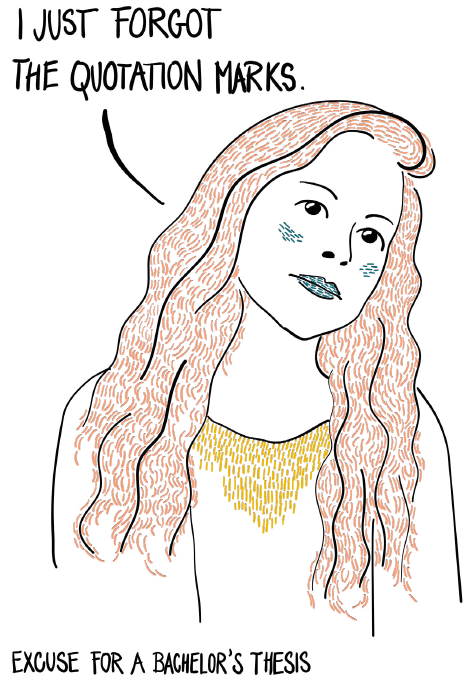Final tips
Few people decide to become plagiarists at the outset. But then they might realise that their topic is too complex, or they want to save their time and effort. Or they’re not really into their studies. Or they just want to come up with a new, original idea at any cost. The most common motive for plagiarism is lack of time. The deadline is quickly approaching and secretly borrowing a couple of paragraphs or pages seems like the easiest way out at that point. Here are a couple of tips for avoiding time pressure:
1. Plan your time. And multiply it by two
Producing an academic text requires time. It’s not just about writing, but also searching for sources, reading them and making notes. Insufficient time before the deadline can undermine your otherwise strong integrity.
Estimate the time necessary for writing your paper. Set milestones of what you want to have finished and by when. Allow for some free time in your plan – you can’t just work and write the entire time.
When planning, consider these:
- How does the supervisor imagine that the work will be carried out?
- Does the supervisor require consultations? How often? How often will I need them?
- What do I need to research before I start writing? How will I find my sources?
- Do I need to conduct my own research or experiment?
- How many standard pages do I have to write?
- Approximately how long will the writing take? (You will need to guess at the beginning of your studies, later on you will have a clearer idea.)
- When do I need to submit my work and how? Should I print it, submit it electronically or both?
2. Consult
Keep in touch with your supervisor regularly. That doesn’t necessarily mean often. It’s also not necessary to hold personal consultations; some people prefer e-mail, a phone call or Skype. The consultation shouldn’t be just a formality – it should be beneficial for both sides. Don’t hide it if you’re behind schedule, and don’t pretend that you understand if you’re unsure about something. Two heads are better than one, and your instructor or supervisor was assigned to you for the very purpose of helping you.
3. Don’t be afraid to admit what you don’t know
Academic writing should be part of your curriculum. If it isn’t, or if you weren’t paying attention, don’t be ashamed to admit it and make up for what you’ve missed. Your schoolmates, instructors or this handbook will help you.
4. Read
This might sound hackneyed, but you won’t get any better advice. By reading research and scientific papers, you learn much more than you think. Apart from gaining an insight into different topics, theories and figures, you will also learn about academic text, its rules and structure. You will then have a model on which to base your own work.
5. No secrets, tell everything
Always reference ideas that you borrowed. Even your own ideas, if they proceed from your earlier work. If you’re unsure as to whether you need to reference something, reference it. Even if you don’t feel like searching for the original source, give it the extra couple of (fine, sometimes even couple dozens) minutes, find the original source and reference it. And if someone was helping you, for example with proofreading or translation, which not forbidden, include this information.
In an academic text, it’s better to give more information than to hide something. The clear conscience that your work was really written by you and you correctly referenced everything is invaluable.
Even in a text that was produced fairly, anti-plagiarism software will find similarities. It is just a mechanical aid. It’s necessary to consider and evaluate the result. A similarity percentage by itself means nothing.
6. Remember the three tips against plagiarism
You always need to:
- Distinguish someone else’s ideas from your own
- Reference the original source
- Identify the original source so that it can be traced back
7. Admit a mistake if you make it
If your plagiarism is exposed, admit it. If you’re already trying to cover up some error, don’t wait until it’s exposed and own up to it. You will still be punished, but at the same time you will have opened a way out. This will ease your conscience and you will be one of those who face up to their problems.
